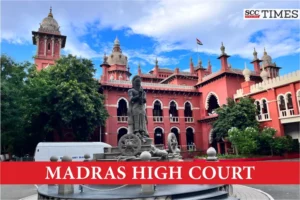Madras High Court: In a civil revision petition filed under Article 227 of the Constitution of India, against the order passed by the Additional District and Sessions Court, wherein the Court dismissed the application of the petitioner for rejection of the written statement, G.R. Swaminathan, J. said that Order 7 Rule 11 CPC provides for rejection of plaint. There is no provision for rejection of a written statement. Thus, the question of invoking inherent jurisdiction for this purpose does not arise. Thus, the Court upheld the Trial Court order to this extent. However, the Court said that the reception of the written statement is not in order. Thus, the Court set aside the order dated 02-08-2023 and said that as the order dated 02-08-2023 has been set aside the petition for rejection of written statement becomes infructuous.
Background:
The petitioner is the former employer of the respondent, who was terminated in 2022. The petitioner alleged that the respondent engaged in actions detrimental to its interests, leading to the filing of a suit to prevent such actions. An interim injunction was sought against the respondent, but the Trial Court only issued a notice without granting an ex-parte interim order. Aggrieved by the same, the petitioner filed a criminal petition, and an interim injunction was initially granted. After the petition was disposed of, the respondent filed a memo enclosing the copy of the order dated 21-06-2023 along with his written statement which was accepted by the Trial Court . Thereafter, the petitioner filed an application for rejection of the written statement. The Court below vide order dated 03-07-2024 dismissed the application. Questioning the order dated 02-08-2023 , wherein the Trial Court took the written statement on file, the petitioner filed the present petition.
Analysis and Decision:
The Court noted that Order 8 Rule 1 of the Code of Civil Procedure Code, 1908 (‘CPC’) states that a written statement should be filed within thirty days from the date of service of summons on the defendant. The proviso to the Rule permits the defendant to file the same on such other day, as may be specified by the court, for reasons to be recorded in writing, but which shall not be later than ninety days from the date of service of summons.
The Court emphasized that in Salem Advocate Bar Association, T.N. v. UOI (2005) 6 SCC 344, it was clarified that the upper limit of ninety days is directory. It was cautioned that the order extending time to file written statement cannot be made routinely and that time can be extended only in exceptionally hard cases.
The Court said that this provision has engaged the attention of the Supreme Court and the High Courts during the last two decades. However, the practice of the Trial Courts is not in consonance with the principles laid down.
The Court remarked that the mistake of the court should not harm a party. But no party can take advantage of the lapse committed by the court particularly when it is contrary to the statute.
The Court clarified that filing of written statement after the expiry of thirty days can be accepted only if there is an application in writing for condonation of delay, as Order 8 Rule 1 of CPC envisages recording of reasons by the court for permitting belated filing of written statement. The Court mentioned that when the Court is expected to record reasons, it is obvious that there must be an application for condonation in writing. It also presupposes that the defendant offers proper explanation for the delay. When there is no such application either for condonation of delay in filing the written statement or for extension of time for filing the written statement, the court ought not to on its own extend time for filing the written statement while granting adjournments. Doing so would be contrary to Order 8 Rule 1 of CPC.
The Court reiterated that if the power is given to do a certain thing in a certain way, the thing must be done in that way.
The Court cited an article titled “Adhering to Statutory Timelines: A Step Towards Better Case Management of Civil Trials” by Hasit B. Seth, 2021 SCC OnLine Blog Exp 6 , wherein, concerning with the culture of delay in filing of pleadings in courts, the Author said situation can be remedied only by strict enforcement of the timelines.
The Court reiterated that “the Trial Courts cannot on their own extend the time for filing the written statement after the expiry of thirty days. It can done only at the request of the defendant. The request cannot be made orally. It should be in writing. It should contain good reasons. Any written statement filed after thirty days can be accepted only upon condonation of delay in filing the same. The defendant must submit an application and offer a proper explanation for the delay”.
The Court emphasised that the Trial Court must bear in mind the caution administered by the Supreme Court in Salem Bar Association (supra), Kailash v. Nanhku, (2005) 4 SCC 480 and Desh Raj v. Balkishan, (2020) 2 SCC 708. The orders condoning delay must contain reasons and cannot be mechanically passed. While condonation of delay is discretionary, recording of reasons is mandatory.
The Court said that Order 7 Rule 11 CPC provides for rejection of plaint. There is no provision for rejection of a written statement. Thus, the question of invoking inherent jurisdiction for this purpose does not arise. Thus, the Court upheld the Trial Court order to this extent.
However, the Court said that the reception of the written statement is not in order. Thus, the Court set aside the order dated 02-08-2023 and said that as the order dated 02-08-2023 has been set aside the petition for rejection of written statement becomes infructuous.
[Ramesh Flowers Private Limited v. Sumit Srimal, 2024 SCC OnLine Mad 4785, decided on 13-09-2024]

